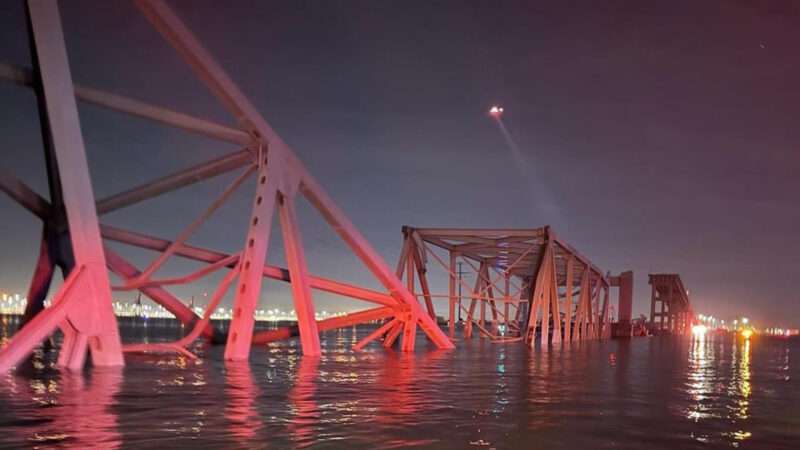
The collapse of the Francis Scott Key Bridge figures to snarl traffic around Baltimore, but the bigger problem might be the downed bridge's effect on maritime activity.
Until the bridge's wreckage can be cleared away, the Port of Baltimore is cut off from the Chesapeake Bay, the Atlantic Ocean, and the global supply chains beyond. It remains unclear how long the port will be closed, but federal Transportation Secretary Pete Buttigieg said Wednesday that there could be a "long and difficult path" ahead.
In the meantime, trade flowing through the port will have to be redirected to other ports along the East Coast. That's a disruption that could mean higher costs and other complications—and it is a particularly acute issue for the roughly 15,000 workers who earn a living off the commerce that passes through Baltimore's port.
Clearly, there's every reason to make sure the port can be reopened as quickly as possible. Buttigieg acknowledged as much on Wednesday, and said the White House had given a "clear directive" to "tear down any barriers, bureaucratic as well as financial."
But Buttigieg stopped short of naming any specific federal regulations that might be waived to speed along the recovery efforts in Baltimore. Here's one that should go right to the top of the list: The Foreign Dredge Act of 1906.
The Foreign Dredge Act is an older cousin to the more well-known and infamous Jones Act, which bans foreign-built ships from moving goods between American ports. As a result, it drives up shipping prices to places to Puerto Rico and Hawaii, adds traffic to American highways, and leaves sizable parts of the country without access to natural gas.
Like the Jones Act, the Foreign Dredge Act is a purely protectionist law that forbids foreign-built dredges—vessels built to remove debris from waterways and to deepen and widen shipping channels—from operating in the U.S. Any foreign dredge caught doing work in American waters is subject to immediate forfeiture.
The law was originally meant to protect American dredge-building companies from foreign competition. More than a century later, however, the primary outcome of the Foreign Dredge Act has been severely curtailing the number of dredges available to do important work like removing the wreckage of the Key Bridge. Many that are in use are sub-standard compared to the rest of the world. The Army Corp of Engineers is still using dredges built in the 1930s, for example, while a recent study from Tulane University found that "the combined capacity of the U.S. [hopper dredge] fleet is less than a single EU [European Union] dredging vessel."
Being shielded from competition means American dredge-building companies haven't needed to keep up with developments made elsewhere in the world. Clearing away the debris and reopening the Port of Baltimore is likely to depend on outdated equipment, and will therefore likely take longer than it otherwise might.
Waiving the Foreign Dredge Act now might help in some small way—perhaps better dredges can be brought in from Canada or somewhere else nearby—but the collapse of the Key Bridge is a great reminder that we shouldn't wait until there's a crisis to start undoing bad laws. It would have been better to repeal the Foreign Dredge Act five or 10 or 50 years ago, so that America would already have access to the best dredging technology in the world.
When there's not a crisis, the Foreign Dredge Act is still a problem. It is one of the main reasons why American ports generally have smaller shipping channels and lower capacity than ports in other parts of the world. Those marginal costs might be easy for policymakers to ignore during normal times, but the closure of the Port of Baltimore should throw this problem into stark relief.
What happens next will be telling. Will the Biden administration follow through on its promise to sweep aside policies that will slow the recovery in Baltimore, or will it choose counterproductive protectionism over the interests of the East Coast's economy and 15,000 blue-collar workers?
The post The Obscure Protectionist Law That Will Slow Clean-up of the Baltimore Bridge Disaster appeared first on Reason.com.







